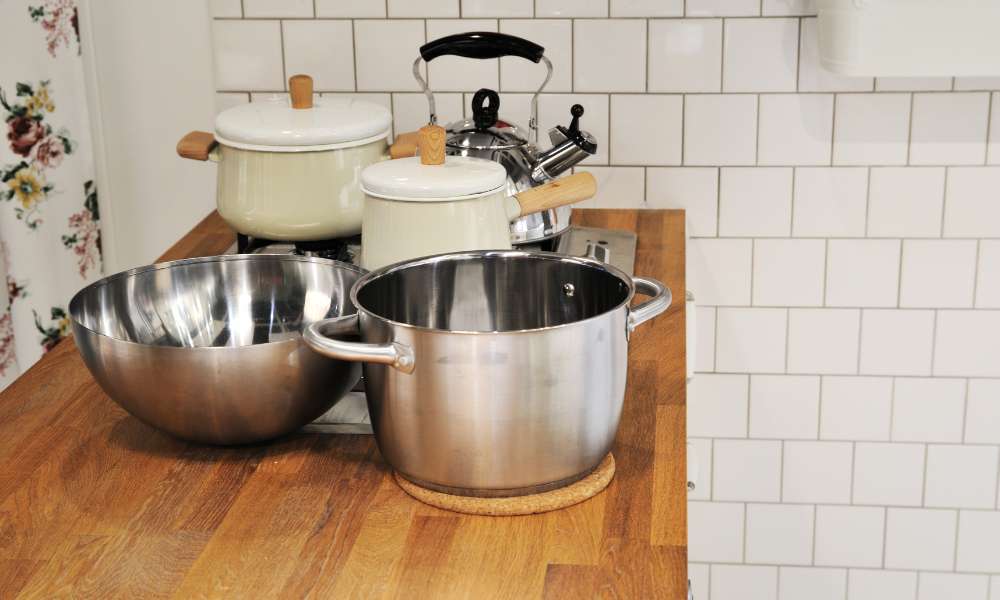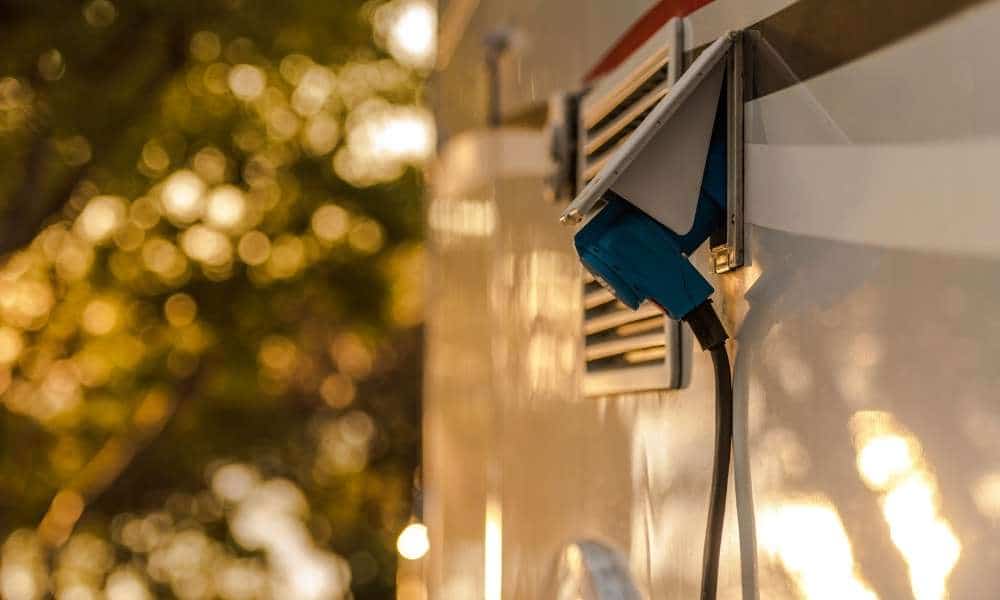Anodized cookware Is becoming increasingly popular in modern kitchens due to its durability And ease of use. Clean hard anodized cookware can be A bit of A challenge if you don’t know the right process. But fear not! With A little effort And some basic supplies. You can keep your anodized cookware looking shiny And new for years to come. It’s important to avoid using harsh abrasives or metal scrubbers on your anodized cookware as they can damage the surface. Instead, opt for soft sponges or brushes with non-abrasive pads. Use warm soapy water to wash your cookware after every use And dry it off with A clean towel before storing it away.
What is Hard Anodized Cookware?
Hard anodized cookware Is A type of cooking equipment that has been treated with A special coating to make it more durable And long-lasting. Anodized cookware Is made from aluminum, which Is known for its ability to distribute heat evenly And quickly. The process of anodizing involves immersing the aluminum in An acid bath and then applying An electric current, which creates A layer of oxide on the surface.
Why Is Hard Anodized Cookware Popular?
The anodization process also improves the heat distribution of The material, which ensures that food cooks evenly throughout the pan without Any hot spots. The surface of hard anodized cookware Is also non-stick, making it ideal for cooking delicate foods like fish or eggs. It requires less oil than traditional non-stick surfaces, which makes it A healthier option for those looking to reduce their fat intake.
Tips For Cleaning Hard Anodized Cookware
Hard anodized cookware has become increasingly popular due to its durability And scratch-resistant surface. Maintaining the quality of this type of cookware can be challenging if not cleaned properly. The first step in cleaning your hard anodized cookware is to read the manufacturer’s instructions carefully. Some brands may recommend hand-washing with mild soap And warm water. While others may suggest using A dishwasher.
Avoid using abrasive sponges or steel wool As they can leave scratches on the surface of your anodized cookware. Instead, opt for soft sponges or brushes made specifically for non-stick surfaces. If you notice Any food stains or burnt residue on your hard anodized cookware, try soaking it in warm water mixed with baking soda for A few hours before scrubbing it off gently.
Nonstick Cookware
Nonstick cookware has become A popular choice for many households due to Its ease of use And cleaning. However, not all nonstick coatings Are created equal. Anodized cookware Is A type of nonstick cookware that offers several benefits over traditional nonstick coatings.
Anodized cookware Is made by electrochemically bonding An oxide layer to the surface Of the metal, creating A durable And scratch-resistant coating. This process also prevents the metal from reacting with acidic or alkaline foods, which can affect taste And cause discoloration. Additionally, anodized cookware is less prone to warping And corrosion compared to other types of nonstick coatings.
One advantage of anodized cookware Is its ability to distribute heat evenly across the surface, reducing hot spots that Can burn the food or cause uneven cooking.
Importance Of Cleaning Hard Anodized Cookware
Anodized cookware has gained immense popularity in the recent past due to its durability, non-stick properties, And even heat distribution. It is important to note that this type of cookware requires special care And attention to maintain its quality. One of the most crucial aspects of maintaining anodized cookware Is regular cleaning.
Cleaning hard anodized cookware may seem like a daunting task. But it Is essential to ensure that your investment lasts for years To come. The first step in cleaning this type of cookware Is to avoid using abrasive cleaners or scrubbers that could scratch the surface. Instead, opt for gentle dish soap and warm water along with A soft sponge or cloth.
Another important aspect of cleaning anodized cookware Is avoiding high-heat cooking techniques such as searing or broiling At high temperatures As they can damage the surface layer.
Using the Right Cleaners
Anodized cookware has become increasingly popular In recent years due to its durability, non-stick properties, And the ability to distribute heat evenly. However, using the wrong cleaners can cause irreparable damage to your anodized cookware. It Is essential to understand what types of cleaners Are safe for use on this type of cookware.
The first step in cleaning anodized cookware Is always to refer to the manufacturer’s instructions. They will typically provide specific guidelines on how best to clean And care for your particular product. Generally speaking, most anodized cookware can Be cleaned with mild dish soap And warm water. Avoid using harsh chemicals or abrasive sponges. That can scratch or strip away the surface of The anodization.
Use A Salt Scrub
Using a salt scrub Is An excellent way to maintain And extend the durability of your anodized cookware. Anodized cookware Is highly resistant to scratches, But over time, it can still develop signs of wear And tear that could affect its performance. By using A salt scrub regularly, you can ensure that your cookware stays in good condition for years to come.
To use A salt scrub on your anodized cookware, start by mixing coarse sea salt with water until it forms A paste-like consistency. Then apply the mixture onto the surface of your cookware And gently rub in circular motions using A soft sponge or cloth. Be sure not to use any abrasive materials or harsh chemicals as this can damage the non-stick coating on your pan.
Use Baking Soda
Anodized cookware Is A popular choice for home cooks and professional chefs alike. However, cleaning this type of cookware can sometimes be A challenge. That’s where baking soda comes in – this versatile ingredient can work wonders when It comes To cleaning anodized cookware.
First, start by mixing baking soda with some warm water to create a paste. Then, apply the paste to your anodized cookware And scrub gently with a soft brush or sponge. The gentle abrasiveness of the baking soda will help remove Any stubborn stains or food residue without damaging the surface of your cookware.
In addition to being an effective cleaner baking soda also has deodorizing properties. That can help get rid of any unwanted odors on your anodized cookware. Simply mix some baking soda with water And soak your cookware In the solution for several hours before rinsing clean.
Use Vinegar
If you’re in search of A solution to cleaning your anodized cookware, look no further than vinegar. Anodized cookware has become increasingly popular due to Its durability And non-stick properties making. It Is perfect for everyday kitchen use. However, cleaning these pieces can be A bit tricky As traditional methods may damage the surface.
Vinegar Is A natural And effective way to clean anodized cookware without causing Any harm. Its acidic nature helps remove stubborn stains And build-up while also restoring the shine of the metal. To get started, simply mix equal parts water And vinegar in A bowl or spray bottle.
Next, apply the mixture onto the surface of the cookware using A soft-bristled brush or sponge. Allow it to sit for about 5-10 minutes before scrubbing away At Any remaining debris.
Use Dish Soap
If you own anodized cookware, then you know how tough It can be to keep it looking clean And shiny. However, there’s A simple solution that might surprise you: dish soap. That’s right – the same soap you use to wash your dishes could Be the key to keeping your anodized cookware in top condition.
Clean Anodized cookware Is made from aluminum that has been treated with An electrochemical process, creating A hard surface that Is resistant to scratches And corrosion. However, this surface can still become stained or discolored over time if not properly cared for. That’s where dish soap comes in – its powerful cleaning agents are perfect for cutting through grease And grime on your anodized pots and pans.
Use Hot Water And Lemon
Anodized cookware has become increasingly popular over the years. It is known for its durability, even heating distribution, And scratch-resistant properties. However, clean anodized cookware can be A bit tricky since harsh chemicals or abrasive sponges can damage the protective layer of the pan.
One easy And effective way to clean anodized cookware is by using hot water And lemon. Simply fill your sink with hot water, squeeze in some fresh lemon juice And let your anodized pots or pans soak for about 15-20 minutes. The citric acid from the lemon will help break down any food particles or stains while leaving your cookware looking shiny And new.
After soaking, gently scrub your anodized cookware with A soft sponge or brush to remove Any remaining residue. Rinse thoroughly with warm water before drying it off with A soft cloth.
NutriChef Nonstick Kitchen Set
NutriChef Nonstick Kitchen Set Is An excellent addition to your kitchen. This cookware set features anodized aluminum construction, which means that It Is durable And resistant to corrosion. The nonstick coating allows for easy food release And effortless cleanup after cooking.
The NutriChef Nonstick Kitchen Set includes frying pans, saucepans, A Dutch oven pot, And utensils that Are perfect for everyday use in the kitchen. The tempered glass lids with steam vents allow you to monitor your food while cooking without having to lift the lid continuously. The ergonomic handles provide A comfortable grip when cooking And remain cool even on the stovetop.
This cookware set is suitable for all stovetops except induction And can withstand high temperatures up to 500°F/260°C. It also comes with nylon utensils that will not scratch the nonstick surface of the pots And pans.
Circulon Elementum Cookware
Circulon Elementum cookware line of anodized cookware that designs to meet the needs of modern cooks. This high-quality cookware is made from hard-anodized aluminum, which makes It durable and long-lasting. The non-stick surface of the Circulon Elementum cookware ensures that food doesn’t stick to The pan, making It easy to clean after cooking.
One of the main benefits of using anodized cookware such as Circulon Elementum Is that it heats up quickly And evenly. This means that you can achieve perfect cooking results every time without having to worry about hotspots or uneven heating. Additionally, the anodized surface of the Circulon Elementum cookware resists scratches and stains, ensuring that your pots And pans remain to look new for longer.
Final Thought
As An avid cook, I have tried out various cookware over the years. But there Is one type of cookware that has always caught my attention – anodized cookware. Anodized cookware creates by treating aluminum with A special oxidation process that makes It stronger, more durable, And resistant to scratches And abrasions. This type of cookware Is becoming increasingly popular due to Its unique properties.
One of the reasons why anodized cookware stands out from other types of cookware Is Its ability to heat up quickly And distribute heat evenly. This means that you Can achieve consistent cooking results every time you use it. Additionally, anodized cookware Is non-stick, which makes cooking And cleaning effortless. You don’t have to worry about food sticking to The surface or using too much oil when cooking your meals.





